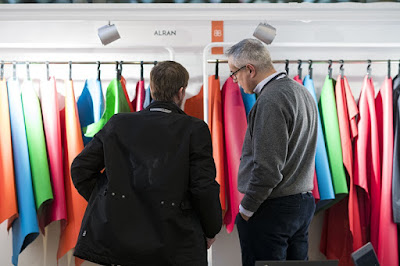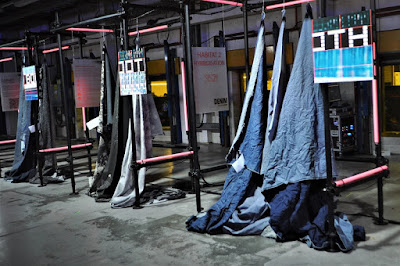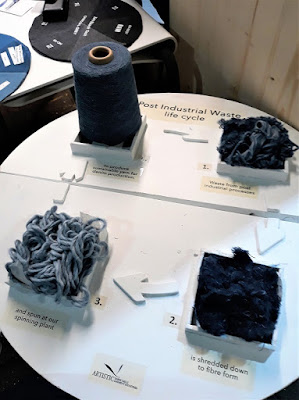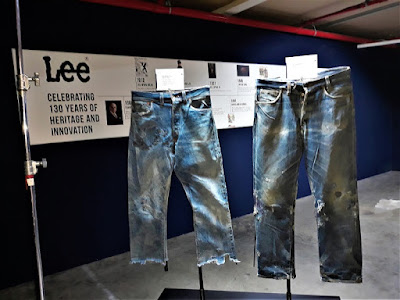It’s no longer regarded as a novel idea or a trend, but a must-take
path for textile and material companies to embrace
sustainability and there is no
exception for denim, traditionally seen as one of the most un-eco-friendly
materials.
Thus it was not a coincident that sustainability was the main
message from many exhibitors at the 2nd
London edition of
Denim
Première Vision, held December 3 – 4 2019, where the fair focused on creativity
and eco-responsible denim collections as the headline project for the Spring-Summer
2021 season.
Showcased at the fair, held in Printworks in Canada Water, south London, was
a selection of sustainable developments in terms of sourcing, production
processes and finishings.
These were highlighted in a focus area named
Habitat 21, created in collaboration with Italian designer Kristian
Guerra with installation designed by Filippo Maria Bianchi.
Displayed fabrics were from a selection of exhibitors
selected by PV’s own Smart Creation team.
Exhibitors in this area included Advance Denim, Berto, Bossa,
Calik Denim, Kilim Denim, Naveena Denim Mill, Orta Anadolu, Panama Trimmings,
Properity Textile, Rajby Industries, Raymond Uco Denim, Soorty, and
Tavex-Evlox.
According to the organisers’ fashion team, the SS 2021 denim
fashion trends presented by Manon Mangin, focus on the key words of the season: Earth, Water, Work, Mobility and Fantasy.
Earth and Water refers to environmental links with nature with renewable materials such as linen and hemp, with pared down surfaces and clean refined elegant dimension, and denim inspired by ecological aspects with soft handles mixing organic with soy fibre.
Work denotes the raw appearance of visually more compact denims for apparel with structured silhouettes, surfaces with light reflection and dyed with shine.
While Mobility is lifestyle-led focusing on fabrics with abstract movement, with smooth suppleness, fine substances with density while Fantasy is a colour story with dyed fabrics, soft contrasting patterning, tone on tone brights for offbeat silhouettes.
Emulating qualities from nature was a popular direction from many exhibitors. New developments from a number of exhibitors combine refined elegant textures with
irregular surfaces and non-uniformity as the norm, in blends of linen and hemp, organic, biopolymers and alternative along with organic and
recycled cotton and soy protein fibre, along with traceable supply chains with conscious applications to manage waste and energy efficiently under social and ethical initiatives.
The eco-ethics transcend to accessories as well, including Lyocell zips, responsible galvanised rivets and buttons, and organic cotton trimmings and labels.
Spanish denim maker Evlox drove its message of total
sustainable denim fabrics with natural inky hues and
textures and patterns inspired by waves and sky. The company prides itself on authentic sustainable fabrics linking cutting-edge technology with reliable suppliers. In addition to utilising recycled materials, they use a dyeing technolgy that reduces water consumption, and sustainable finishing and better performance through laser finishes. Their bionim high-tech denim is boosted to stay cool, dry and comfortable to wear with a polyester layer fibre with water repellency and high tenacity.
PG Denim of Italy celebrated main innovations in 100%
sustainable denim with a fashion twist thanks to the tireless research by CEO
and project Founder Paolo Gnutti, who has driven the company to a substantial
turnover increase by 40% this year, and rapid expansion into the US market
through partnerships with more than 20 US brands.
The company’s new WOW Denim SS 2021
collection shows printed materials restyled through colourful techniques drawn
from flowers from the historical traditions of Provence and inspired by
nature.
There is also a new range of printed
velvet denim and velvet stripes using viscose flock achieving different effects
using various washing processes.
Another
new collection is called Studio 54 inspired by the metallised colours of cars
in the 1950s and 60s featuring colour pastes glittering against dark
backgrounds and painted effects.
Italian shirting expert
Canclini took part in Denim PV for the first time, showcasing a restyled
collection
Blue 1925 for its new denim range, with blue and indigo as
the main colours, and trendy tones using over-dyeing. The goal was to make the
fabrics more appealing to the younger generation. Main qualities included
linen, hemp and bamboo, regenerated cotton, and recycled fibres.
Effect innovations range from garment to
yarn-dyed, shuttle-loom developed as well as jersey, jacquard fil-coupe and
printed materials.
Another special event during the London Denim PV was a
special workshop: “Learn how to Re-Trace an iconic pair of jeans”, run under the watchful eye of the
maestro
Alessio Berto from the
Tailor Pattern Support in Italy.
The workshop run on both days of the trade
fair focused on the importance of pattern-making allowing participants to have hands-on
opportunity to learn how to create patterns based on heritage jeans of three iconic brands: the Levi’s 501, Lee 101Z and Wrangler 11MWZ.
One of the highlights in this December fair was an exhibition of
valuable iconic jeans in collaboration with
M.O.D.E. – Museum of Denim Elleti in
Verona Italy. It gives visitors insights into the history of denim through a selection
of rare original jeans selected from the museum in three areas of exploration
that tell the history of the iconic workwear fabric through showcasing the brand identity of the
LEE jeans and their transformation, the designing, creating and wearing of WWII
influenced clothing and the vital history of the hard-wearing dungarees or overall.
Photos by Content Editor Lucia Carpio (except for the one she is photographed with the pattern-cutting maestro Alessio Berto at the "Re-Trace" workshop during Denim PV London.
The next Denim PV event will take place June 10
& 11 2020, at Superstudio Piu, Milan, Italy.



















